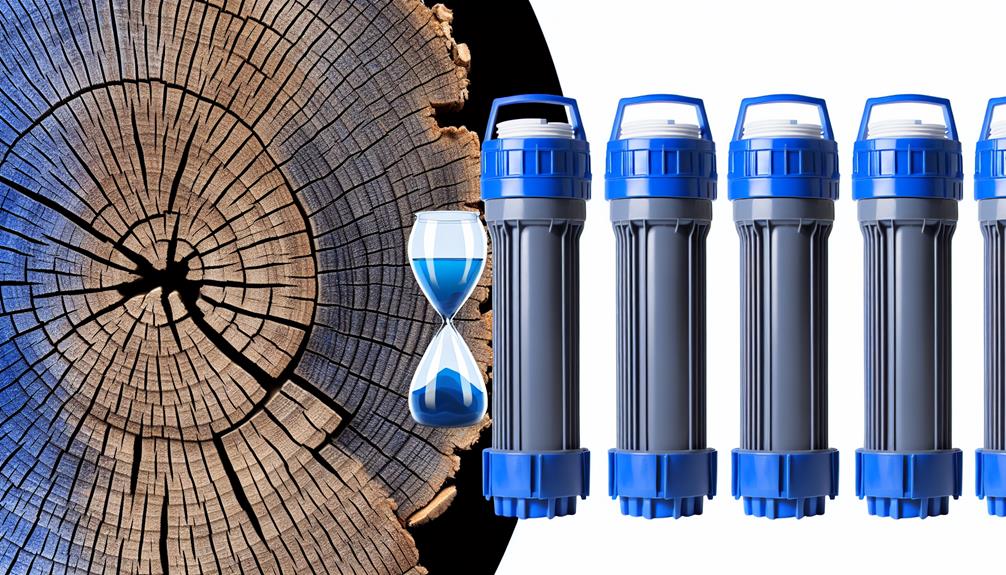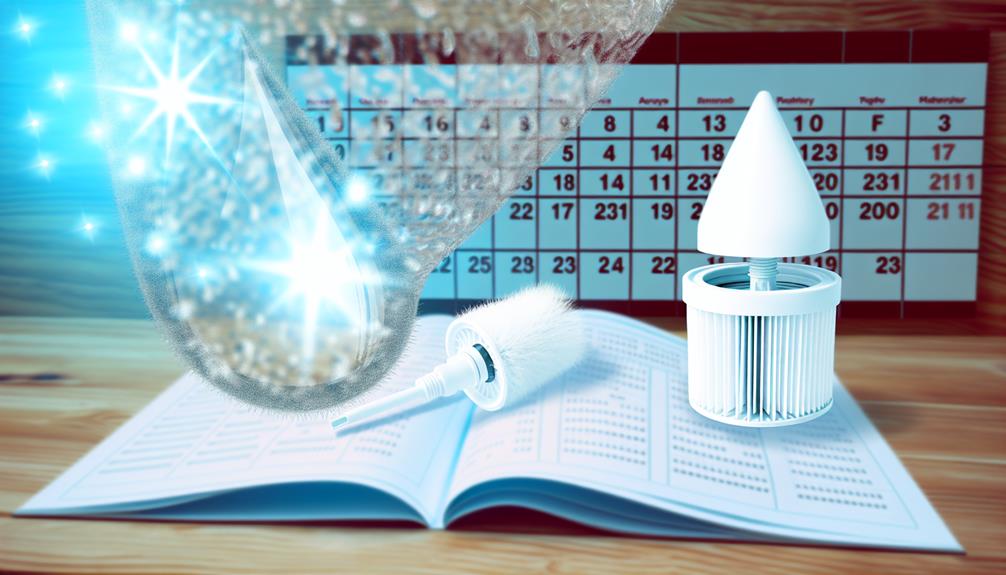While it's easy to assume that your water filter should last as long as the manufacturer promises, you've likely noticed signs that it might be expiring prematurely, such as a change in taste or reduced flow rate.
You're not alone in this experience, and there are several factors that could be curtailing the lifespan of your water filter, beyond the simple passage of time. Understanding the average lifespans of different types of filters and recognizing the common signs of filter fatigue are crucial first steps.
However, it's the often-overlooked variables, from water quality to maintenance habits, that play a pivotal role in determining how soon you'll need to replace your filter. As we explore these factors, you'll uncover insights into how you can extend the life of your water filtration system and ensure it provides the clean, safe water you rely on.
Common Signs of Filter Fatigue
Recognizing the common signs of filter fatigue is crucial to ensuring your water quality remains high and your filter functions effectively. One definitive indicator that it's time to change your water filter is reduced water flow or low water pressure from the dispenser. This can often point to a clogged old filter that needs to be replaced to restore optimal performance.
A foul odor or strange taste in your water and ice is another clear sign that your filter is no longer effectively screening out contaminants. These sensory cues suggest that changing a water filter can significantly improve the water's palatability and safety.
Moreover, if you're encountering an increased frequency of filter-related issues, such as leaks or malfunctions, your filter is likely showing signs of fatigue and requires prompt filter replacement.
Don't ignore the refrigerator's built-in indicator light or alert system either. These are designed to alert you precisely when you need to replace the water filter. Ignoring these signals can compromise your appliance's efficiency and the purity of your water.
Lastly, if your water filter hasn't been changed in a long while, don't delay. Regular maintenance ensures the longevity of both the filter and your device.
Average Lifespan by Filter Type
Understanding the average lifespan of various water filter types is essential for maintaining the effectiveness of your water filtration system. Whole house water filters, which include main filters along with pre-filters and post-filters, have different replacement schedules. Main filters may last 3-6 months, while pre-filters and post-filters often need to be replaced every 1-3 months.
For under-sink water filters, the timeframe to replace can vary significantly by model. Manufacturers recommend replacement intervals ranging from 6 months to 2 years, dependent on the specific type and usage. Countertop water filters generally require a replacement water filter every 6 months to ensure peak filtration performance.
A refrigerator water filter usually needs to be replaced every 6 months. This timeline is crucial to guarantee clean and safe drinking water from your fridge dispenser. Shower filters, although their lifespan varies, also most commonly need a replacement every 6 months to uphold consistent water quality.
Factors Affecting Filter Longevity
While the average lifespan of water filters is a useful benchmark, the actual longevity of your filter can be influenced by several key factors, including water quality and consumption rates. High levels of harmful chemicals and contaminants in your water supply can cause the filter to clog more quickly, necessitating you to change your filters more often than you might expect.
Increased water consumption also plays a crucial role. If you use more water, the filter will need to be replaced sooner due to the greater volume of impurities it must process. Conversely, regular maintenance can help extend the life of your filter. Proper cleaning and timely upkeep are essential to ensure your water stays clean and your filtration system operates effectively.
Remember, different types of water filtration systems may have specific requirements. Some need to be replaced every 6 months, while others have varied lifespans. Environmental factors such as temperature, humidity, and sunlight exposure also affect filter longevity, potentially degrading filter materials or altering their efficacy.
To determine the time to replace your filter, consider these factors affecting filter longevity and consult your system's guidelines. By understanding these elements, you'll be better equipped to maintain the quality of your water and the durability of your filters.
Maintenance Tips for Longer Life
To maximize your water filter's lifespan, it's essential to adhere to a regular maintenance schedule and handle routine cleaning with diligence. Implementing maintenance tips for your water filters not only ensures the purity of your water but also contributes to a longer life for your filters.
Firstly, it's pivotal to change your filter according to the manufacturer's recommendation, typically every six months. This ensures that contaminants are consistently removed and prevents the filter from becoming a breeding ground for bacteria.
In between changes, clean your filter by following the specific cleaning instructions for your model. This may involve rinsing or gently scrubbing the system to remove sediments and buildup.
Furthermore, monitor your water's quality. If you notice changes in taste or clarity, it might indicate that your filter is due for a replacement sooner than anticipated. Don't wait for the prescribed period to end; install a new filter immediately to maintain optimal filtration performance.
When to Replace Your Filter
Knowing when to replace your water filter is critical, as it ensures the continued safety and quality of your drinking water. You'll need to change your filter periodically to maintain clean water free from contaminants that could cause health problems in children and adults alike. The frequency at which you change your filter depends on the type and model number of your system.
For instance, whole house systems may require a new filter less often than an under-sink unit due to their capacity and usage levels.
Typically, water filters need replacement every two to six months, but this can vary. Pay attention to signs of a declining filter, such as a strange taste or odor in your tap water, or a noticeable decrease in water flow. These symptoms indicate it's time to change your water filter.
To prevent any compromise in your drinking water quality, familiarize yourself with your system's specific replacement schedule. Neglecting this duty not only risks the purity of your water but also can lead to increased filter-related issues and potential health risks. Always have a replacement filter on hand to ensure you can maintain a continuous supply of clean water.

